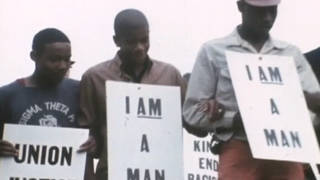Starvation Wages Are a "Crime": Lessons from MLK & 1968 Memphis Sanitation Strike, 50 Years Later

This week, commemorations are being held to mark the 50th anniversary of the assassination of Dr. Martin Luther King Jr. The civil rights leader and peace activist was gunned down April 4, 1968, on the balcony of his hotel room at the Lorraine Motel in Memphis, Tennessee. He was just 39 years old. King was in Memphis to support striking sanitation workers, who he saw as being on the front lines of fighting poverty and integral to his new initiative, the Poor People's Campaign. "It is a crime for people to live in this rich nation and receive starvation wages," King told people in Memphis shortly before his death. In the late 1960s, King recognized that the next phase in the quest for civil rights and equality would focus on the economic divide. We speak with William "Bill" Lucy, former secretary-treasurer with AFSCME. He played a key role in the 1968 Memphis sanitation workers' strike. He is also president emeritus of the Coalition of Black Trade Unionists. Also with us in Memphis is H.B. Crockett, one of the striking sanitation workers in 1968. He worked for the Memphis Sanitation Department for 53 years before retiring.